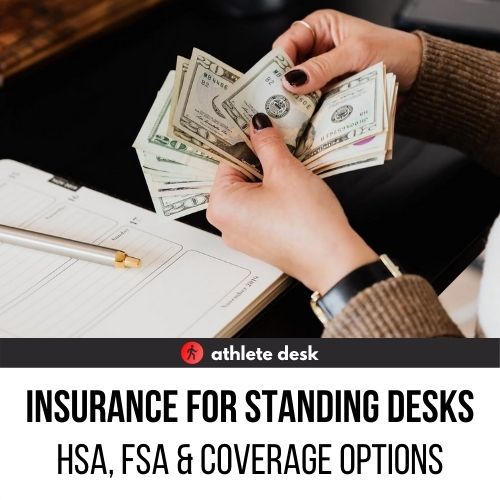Standing desks are becoming increasingly popular for reducing the amount of time that we spend in sedentary activities and reducing problems associated with sitting.
We're going to discuss...
- HSA, FSA insurance plans and their respective deductibles for standing desk coverage.
- When NOT to pay for your desk alternative with health insurance.
- Doctor's note or prescription for getting your standing desk.

While the health benefits of standing desks are still somewhat controversial, the downsides of sitting are well-documented enough that your physician is likely to agree that a standing desk can be beneficial to you for a variety of health concerns.
Insurance can cover a standing desk under certain circumstances, but there are conditions that must be met. Here's what you need to know about whether insurance can cover a standing desk.
What is an HSA and Why do You Need it For Your Standing Desk?
A health savings account, or HSA, is a very versatile savings account that lets you put money aside pre-tax to pay for medical expenses. If your doctor agrees that a standing desk would be beneficial to a medical condition that you have been diagnosed with, you will likely be able to use your HSA to pay for your standing desk.
Keep in mind that generally, an HSA is only available when you have a health plan that has high deductibles. If your deductible is very high, the HSA can help you to meet your healthcare equipment-related needs. The tax-free money can be very helpful in paying for things that may not be covered by your insurance otherwise, like a standing desk.
HSA vs FSA – Which One is Best For Deductibles Such as a Standing Desk?
Both the HSA, or health savings account, and the FSA, or a flexible savings account, are designed to help you pay for medical expenses outside of doctor visits, including equipment. However, not everybody is eligible for either option.
People with a low deductible health insurance plan are typically not able to qualify for an HSA through their employer. Therefore, the FSA is the only option for anyone with low deductible health insurance.
Either the HSA or the FSA are good options for getting a standing desk covered under your insurance. Which you choose will depend on what kind of health insurance plan you have and how high your deductible is. If you are not sure what sort of savings account you qualify for, talk to your insurance provider.
When Not to Pay for a Standing Desk with Health Insurance
You may not want to or be able to use your health insurance to pay for your standing desk if...
- You do not have enough money in your HSA or FSA to cover a standing desk along with the other medical expenses you expect for the rest of the year.
- Your medical provider does not believe a standing desk will improve your condition and won't write a letter prescribing one
- You are concerned about having a medical condition on record. There are many reasons why you may be particular about what is on your medical record, but if mobility issues with the workplace are concerned for you, it may be best just to buy your standing desk out of pocket and use your insurance money for other uses.

When to Use Your Insurance to Pay For a Standing Desk
It can be hard to decide exactly when is the right time to purchase your standing desk with your HSA or FSA. After all, you only have a certain amount of budget for medical expenses that are tax-free.
Check with your insurance provider to decide whether your account will roll over or whether you need to use the balance within the year. It's best to save less essential expenses like a standing desk until you are confident that you won't have any other important medical expenses for the year.
Naturally, if your savings account is about to roll over and you will lose the funds inside, now is the time to use the money for a standing desk or any other equipment that will be beneficial to your health.
Can My Doctor Prescribe a Standing Desk?
Your doctor can prescribe any number of desk equipment that may be beneficial to your health, including a standing desk. Rising computer monitors, wrist pads, and more can all be covered under your physician's prescription.
Once a piece of equipment has been prescribed by your physician, it can generally be covered under your savings account, whether HSA or FSA.
Are Standing Desks Beneficial to Your Health?
There is some debate as to whether standing desks are beneficial to your health or not. However, there are well-known dangers associated with long periods of sitting. Sitting for long periods, particularly with less than ideal posture and without taking breaks, is known to cause some health problems.
Long periods of sitting can result in an increased risk for cardiovascular disease, diabetes, obesity, and more. We aren't entirely sure why prolonged sitting is so bad for your health, but it may be related to the tendency of sitting to relax your large muscles. Relaxed muscles don't derive glucose from the blood, which can raise your risk for diabetes.
Sitting may also make your body feel more painful. Joints tend to get tighter and the hamstring muscles are less flexible. When you do move, these tight hamstrings, joints, and muscles make walking painful and make it more likely that you will pull a muscle or suffer some other movement-related injury.
Using a standing desk will cause you to burn slightly more calories and it can prevent your muscles from relaxing in the way they would if you were sitting, which may reduce your likelihood of developing problems associated with long periods of relaxed muscles, like diabetes.
How beneficial a standing desk will be to your health may depend on how you use it. Talk to your doctor about how a standing desk, along with other desk equipment like forearm and wrist support and an ergonomic chair. can benefit your health during your workday.
A standing desk is not a silver bullet that will completely fix your health problems related to computer or desk work, but it can be a tremendous asset when used appropriately.
Read Also: Best Standing Desks for Dual Monitors
How to Use a Standing Desk to Benefit Your Health
Everyone is different and each individual may have different needs from their standing desk. Your physician will be the best one to tell you how to use a standing desk to benefit your health most significantly. That said, here are a few pointers to help you use your standing desk to benefit your health:
Be Conscious of Your Posture
It is a tremendous mistake to think that simply because you are standing, your posture will be improved. Carrying your head forward as you hunch over the computer screen can put significantly more strain and weight on your neck and shoulders, leading to headaches, neck aches, and pain in the lower back.
You can hunch over a computer screen whether you are standing or sitting. Make sure that your head is squarely placed over your shoulders and that your back is straight whether you are at your standing desk or seated.
Here are some pointers to help correct your standing desk posture:
Alternate Between Sitting and Standing
The most common mistake of people who are trying to incorporate a standing desk into their workday is switching completely to a standing desk. Choose a standing desk that can rise off of your desktop surface, enabling you to choose between sitting and standing effortlessly throughout the day.
Experts recommend that you get up and move around frequently, typically every half hour or hour at the least. Many people find that switching between sitting and standing every hour is a good way to keep them conscious of their posture and give their body a variety of positions from which to work.
Adjust the Height Properly
A standing desk that isn't adjusted perfectly can do more harm than good. A standing desk that is too low will cause you to hunch over the keyboard. One that is too high will put strain on your lower back as you lean back to compensate.
- Adjust the height and stand with your legs firmly planted but do not lock your knees.
- Imagine a straight line running from your lower back to the base of your neck.
- Extend your hands out straight from your elbows, ensuring that the risks do not drop down to the keyboard.
Since you'll be adjusting your standing desk throughout the day, you'll need to be sure you are making these calculations every time you raise and lower it. Raising and lowering the standing desk throughout the day actually makes it much easier for you to make your posture a part of your conscious thoughts throughout the day as you adjust the desk to make sure your posture is appropriate.
What to Look For in a Standing Desk
If you are about to use some of your precious savings account to pay for a standing desk, you want to feel confident that the desk you are considering will be a good choice. Here are a few things to look for in a standing desk to make sure that you are making a good purchase decision.
- Stability. A shaky desktop surface will make you feel uncomfortable about resting your forearms on it, hurting your posture.
- Ease of motion. If you have to struggle to raise or lower the desk, you'll be less likely to do it as often as you should throughout the day and you may strain your muscles and back with the effort.
- Keyboard space. You need enough room for support for your wrist to be appropriately ergonomic.
Consider Using Your Insurance Savings Account for a Standing Desk
A standing desk can do wonders for your health, whether you have a particular condition you need to address or you want to improve your overall experience during your workday. Your HSA or FSA insurance accounts are an excellent source of tax-free money to spend on a standing desk to ease your pain or improve your health.








